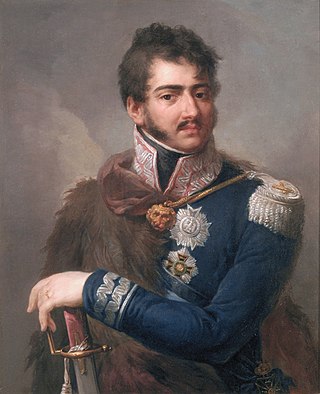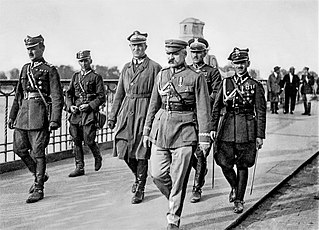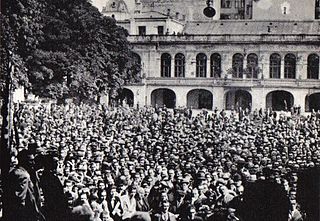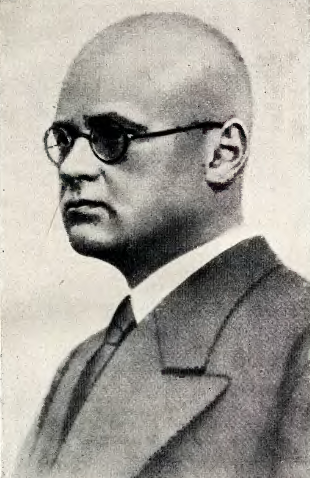| Editor | Józef Landau |
|---|---|
| Publisher | Warszawskie Koło Intelektualistów |
| First issue | October 1930 |
| Final issue | December 1935 |
| Country | Poland |
| Based in | Warsaw |
| Language | Polish |
Rationalist (Polish : Racjonalista) was a Polish magazine published in Warsaw from October 1930 to December 1935 by the Warsaw Circle of Intellectuals, Polish Association of Free Thought.
Editor and publisher of "rationalist" was Józef Landau. The leading publicists were: Tadeusz Kotarbiński, Henryk Ułaszyn, and Józef Landau.

Józef Klemens Piłsudski was a Polish statesman who served as the Chief of State (1918–1922) and first Marshal of Poland. In the aftermath of World War I, he became an increasingly dominant figure in Polish politics and exerted significant influence on shaping the country's foreign policy. Piłsudski is viewed as a father of the Second Polish Republic, which was re-established in 1918, 123 years after the final partition of Poland in 1795, and was considered de facto leader (1926–1935) of the Second Republic as the Minister of Military Affairs.

Prince Józef Antoni Poniatowski was a Polish general, minister of war and army chief, who became a Marshal of the French Empire during the Napoleonic Wars.

Tadeusz Marian Kotarbiński was a Polish philosopher, logician and ethicist.

The May Coup was a coup d'état carried out in Poland by Marshal Józef Piłsudski from 12 to 14 May 1926. The attack of Piłsudski's supporters on government forces resulted in an overthrow of the democratically-elected government of President Stanisław Wojciechowski and Prime Minister Wincenty Witos and caused hundreds of fatalities. A new government was installed, headed by Kazimierz Bartel. Ignacy Mościcki became president. Piłsudski remained the dominant politician in Poland until his death in 1935.

Marian Zyndram-Kościałkowski was a Polish politician, freemason and military officer who served as voivode of Białystok Voivodeship in 1930-1934, Mayor of Warsaw in 1934 and 27th Prime Minister of Poland from 1935 to 1936.

Walery Jan Sławek was a Polish politician, freemason, military officer and activist, who in the early 1930s served three times as Prime Minister of Poland. He was one of the closest aides of Polish leader, Józef Piłsudski.

The Centrolew was a coalition of several Polish political parties after the 1928 Sejm elections. The coalition was directed against Józef Piłsudski and the Sanation government.

The University of Warsaw is a public research university in Warsaw, Poland. Established in 1816, it is the largest institution of higher learning in the country, offering 37 different fields of study as well as 100 specializations in humanities, technical, and the natural sciences.

Józef Lewoniewski was a Polish military and sports aviator. He was a brother of the Soviet aviator Sigizmund Levanevsky.

Józef Feldman was a Polish historian of Jewish ethnicity, professor of the Jagiellonian University in Kraków and a member of the Polish Academy of Learning.
The Chopin University of Music is a musical conservatorium and academy located in central Warsaw, Poland. It is the oldest and largest music school in Poland, and one of the largest in Europe.

Sociology in Poland has been developing, as has sociology throughout Europe, since the mid-19th century. Although, due to the Partitions of Poland, that country did not exist as an independent state in the 19th century or until the end of World War I, some Polish scholars published work clearly belonging to the field of sociology.
Jerzy Tomaszewski was a Polish political scientist and historian, born in Radomsko. He graduated from the Warsaw School of Economics and worked there, later moving on to the Warsaw University of Life Science, and finally to Warsaw University. He specialized in the economic history of Poland and the Polish-Jewish history and relations. He authored many books together with his colleague from the Warsaw School of Economics, Zbigniew Landau.

Powązki Military Cemetery is an old military cemetery located in the Żoliborz district, western part of Warsaw, Poland. The cemetery is often confused with the older Powązki Cemetery, known colloquially as "Old Powązki". The Old Powązki cemetery is located to the south-east of the military cemetery.
Exile to Siberia is a Polish historical film directed by Henryk Szaro and starring Adam Brodzisz, Jadwiga Smosarska and Mieczysław Frenkiel. It was released in 1930. The film's art direction was by Józef Galewski and Jacek Rotmil. The film was originally silent, but a soundtrack was added in a Berlin studio.
Polish Association of Freethinkers (PAF) (Polish: Stowarzyszenie Wolnomyślicieli Polskich; SWP) was a secular movement established in 1907 in Warsaw. Polish Association of Freethinkers was the first such organization in the Polish lands.
Polish Association of Free Thought (PAFT) was a secular movement, founded in 1926 by a group of former activists of the Polish Association of Freethinkers. The Chairman was Zygmunt Radliński, and the board included: Tadeusz Kotarbiński, Józef Landau. In June 1930 PAFT organized in Warsaw Circle of Intellectuals, which primary aim was to deepen the theoretical principles of free thought and to create a center, grouping intellectuals – thinkers from around the country. From October 1930 to December 1935, the Circle published its own monthly magazine "Rationalist" edited by Józef Landau.
Józef Landau was a poet, essayist, philosopher, educational activist, assimilationist, a leading representative of the movement of freethought.

Jakub Lejkin was a Polish lawyer, deputy commander subordinate to the Germans at the Warsaw Ghetto. He was the administrator from May to July 1942. Lejkin played a leading role in the deportation of local Jews to extermination camps. The Germans nicknamed him “little Napoleon” and adored his brutality.

Józef Weyssenhoff was a Polish novelist, poet, literary critic, publisher. Close to the National Democracy political movement after 1905, he paid tribute to the tradition of the Polish landed gentry in the Eastern Borderlands. He lived several years in Bydgoszcz in the 1920s.